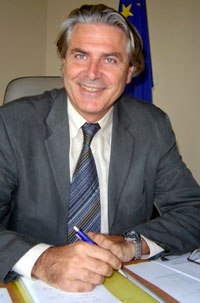Eduardo Lechuga Jimenez, Head of the EU Delegation in Nepal
 Nepali Times: How closely were events here over the past month followed in Brussels and other European capitals?
Nepali Times: How closely were events here over the past month followed in Brussels and other European capitals?
Nepal is an important country for us. The European Commission very closely follows the events taking place here. This interest has increased even more lately, which is reflected in European media also. There is a strong likelihood that more resources would be directed towards Nepal now that democracy has found better footing here.
The visits by the EU TROIKA last year put pressure on the royal regime to rollback. A delegation of MEPs is visiting Nepal soon, what is the purpose of their visit?
The EU disagreed with the political developments that followed the royal takeover on 1 February 2005. We suspended all our pipeline projects and adopted a policy to collaborate with the civil society organisations only. We wanted to express our disagreements with the government but we were careful not to punish the people. The last TROIKA in October 2005 emphasised the message to the government and the palace. If any MEPs come to Nepal in future I would pass on the message regarding our changed position towards Nepal and intentions for the near future.
Now that the country is back to the democratic process, where do you see the commission fitting into the task of reconstruction, rehabilitation and development?
We have welcomed the recent political changes with great expectations. But we work on demands?we expect that the Nepali government approaches us soon with meaningful proposals. Presently the EU is preparing its global plan for 2007-2013 known as Country Strategy Paper, it is likely to put greater emphasis on education in Nepal as it lays the foundation for all empowerment and growth. In the forthcoming Country Strategy Paper emphasis is likely to be laid on economic cooperation with greater private sector participation. However, it would not mean that we will stop our on-going efforts in areas of poverty alleviation, human rights and conflict resolution in Nepal. The EU suspended all its funding after 1 February 2005. An important meeting in May will decide about how to proceed in future.
Where do you see the main political hurdles in the peace process in the coming months?
We welcome the recent declarations of ceasefire from the government and rebels. We expect that the both parties will respect their commitments to the fullest. Now we suggest that the CPN (M) renounce violence completely and make a commitment to decommission weapons. We have already called upon the Seven-party Alliance to continue working together in implementing its roadmap and to make the process leading to constituent assembly election and subsequent reforms inclusive and participatory. All parties need to respect the sovereignty vested in the Nepali people.


